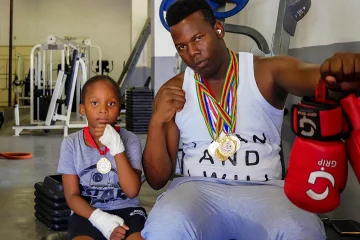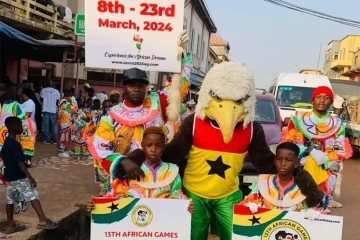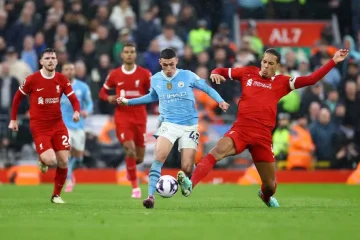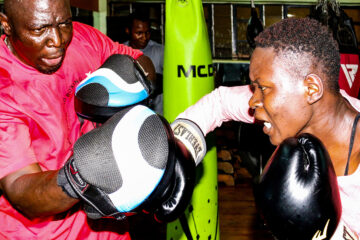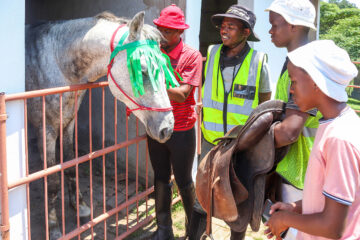OLUWASHINA OKELEJI
LEICESTER City manager Brendan Rodgers’ announcement in September that midfielder Wilfred Ndidi would miss about 12 weeks of football action because of a groin injury was received with a collective gasp in the East Midlands.
Since joining the Foxes in 2017, Ndidi has been highly influential, both in terms of involvement and impact. So important is his function within the side that when he was forced to miss five Premier League matches in January, the club’s title bid was derailed. He was duly rushed back ahead of his scheduled recuperation, with Rodgers at the time describing him as “genetically blessed”.
This is a theme that has persisted through the course of his time in England, and which made his last injury almost inevitable. The Nigerian has played over 12 000 minutes for Leicester since his arrival from Belgian side Genk, making him one of the ever-presents in the squad.
Following a gruelling 2018-19 season, during which he played all 38 league matches, he played close to 600 minutes at the Africa Cup of Nations with Nigeria, before remarkably returning to start the very first match of the 2019-20 league season.
Within this context, it was easy to pick the silver lining in his enforced lengthy lay-off: aside from handing an important lesson in asset management to Leicester and Rodgers, it gave the player a chance at proper recovery and rehabilitation. Pushing himself to the limit physically is something Ndidi has become accustomed to in his life.
The 24-year-old son of a soldier came through significant challenges as a child. His father moved around frequently on peacekeeping operations on the continent and the troubled far north of Nigeria. And the family was often short of money.
Ndidi describes himself as a “Jack of all trades”, with an emphasis on “trades”. He hawked edible goods and produce all day under the sun in the bustling Lagos traffic as his contribution toward the family upkeep. He even started menial work in order to get some money on the side for himself.
“I did different things,” Ndidi says. “Sometimes I hawked pepper, I sold water [sachets], tomatoes and fruits for my mother. But I became famous for selling [groundnut] peanuts. They call me the groundnut boy. I did all these things to support my mother.
“As a side hustle, to get my own personal money I was wiping the windscreens for cars held (up) in traffic. If I’m lucky sometimes I make about N2000 (almost R80) in a day but the highest I made was N3000 (around R118).”
Defying his father to play football
This added income, far from being channelled toward frivolities, was for the advancement of his deepest passion: football. “I was so excited because I was saving up for my first football boots, that money helped me achieve that as I didn’t want to bother my mom with it. Being able to afford my own boots will forever stay with me.”
It was also a secret passion, by necessity. Ndidi’s father wanted his son to focus on his education exclusively, and prohibited him from playing football, considering it a distraction. “Like every African parent, all my father wanted was for me to go to school, get a degree and become a professional at something. Professionals are doctors, engineers, lawyers and others.
“Not sure I was brave enough to say I wanted to be a professional footballer, to even open my mouth and mention the word football would obviously get me something else [punishment] and not a warm hug,” he laughs.
That, however, did little to dampen the youngster’s fervour.
“Whenever my dad was at work, I would play,” he says. “When he was coming back, I would get a signal and immediately go back to doing something else. It did not always work, and I was caught many times. It didn’t matter. I just wanted to play.”
It did not matter either that there were no actual balls, or even a proper pitch; the boys improvised, they played on roads, using balled-up sheets of paper wrapped in sellotape, with car tyres for goals. “The bigger boys used the good pitch. We didn’t have anything to use, so we just played on the road.”
He did, thankfully, have an ally in his mother, with whom his secret was safe. She would even cover for him on occasions when his father was around but he needed to play. When he joined the academy Nath Boys, from where he would find a path to the national Under-17 team, it was without his father’s knowledge or consent. “It was very funny,” he recalls. “My mom and I didn’t say anything to him because all he wanted was for me to study hard, go to school and end up with a degree from the university.
“He was shocked to find out much later. It only became an open thing when I got a chance to play for the national Under-17s. I informed him, and at that point he realised I’ve gone through chasing my dream.”
That dream would ultimately lead him to the bright lights of the Premier League, where he is now an established star. It is the football world’s biggest stage. “Four years ago I didn’t see myself here,” he says. “But all the sacrifices from running after cars to sell my stuff in traffic to surviving the weather and giving my best has finally paid off.”
Almost as crucially, his father is now onside. “With life in the Premier League now, he keeps asking me about our results, next game and how I played. Sometimes, my mom reminds and teases him about his reluctance to allow me to play football in the past and we all get to laugh about it.”
Disciplined from an early age
The military barracks, where Ndidi grew up, can be an unforgiving and perilous environment for a young person. There is a premium on discipline and regimentation, but by the same token there is a lot of exposure to recreational drugs and other vices. The danger of running with the wrong crowd was only too real.
“There were temptations, of course,” he admits. “Not necessarily drugs or anything like that, but to make easy money. You want the quick things out of life and when you see others with it, you also quietly want the same.
“But my mom would always remind me I was still young, so I learnt to take things as they come, and embrace the little things I have. The ones I have, I appreciate them. So I don’t really look toward the big things. I just want to be happy.”
That same ability to keep his feet firmly planted have stayed with him right through to his professional career. Ndidi is not one to show off his lifestyle, and by his own admission remains “shy and calm”, a temperament that transmits itself both in his playing style and his general behaviour.
“I always believe that not everything will go smoothly. So even when it comes, your reaction will be very important. If you lose and you are so down, it will reduce your chances of having the confidence next time around. So, I feel bad when I lose. I even get angry. But I don’t have to show it. I just know that there is another chance to make it better.”
He is also given to learning – “we learn every day,” he says – and in 2018 he enrolled in De Montfort University’s (DMU) Business and Management programme, which runs for three years. His desire, down the line, is to build an academy and give back to the society in which he grew up.
“I wanted to do this course because growing up in Nigeria we didn’t really have the opportunity to actually go to school,” he told the DMU website in 2019. “It’s a personal thing for me that I want to do, to expand myself and learn new things.
“Back home so many kids aren’t able to go to school because their parents can’t afford it. I want to set up a football resort where people can stay and play football while getting an education at the same time. I think it’s really important to try to learn things outside of your normal life.”
Sources close to the player believe his passion for this programme, more than anything, has precluded any discussion of a transfer away from Leicester City. In the summer of 2019, two Premier League giants made approaches for the player, but while the Foxes were always likely to dig in their heels, it was Ndidi’s own unwillingness to force the issue that ultimately saw those offers rebuffed.
The desire to test himself at a higher level remains, however. With his programme at DMU coming to an end in 2021, it may very well be the right time for a new challenge.
Since moving to England, he has had to grapple with comparisons to N’Golo Kanté, who moved from Leicester to Chelsea six months before his arrival.
He said: “I’ve been hearing the Kanté [comparison] since I got to England and it’s a boring cliché now.”
While Ndidi has played down the parallel time and again, come next summer, he could be following the Frenchman’s path to one of the league’s bigger clubs.






